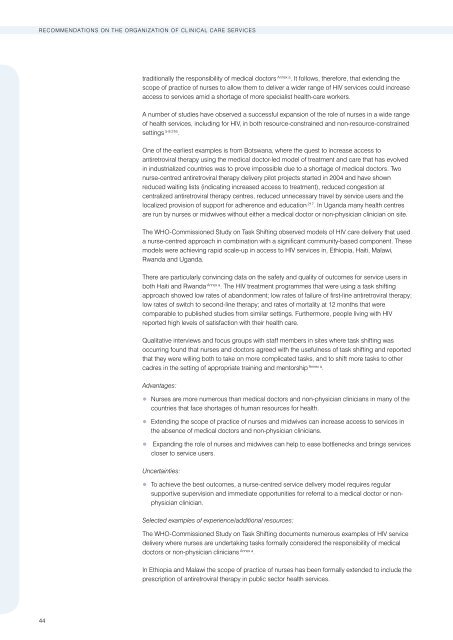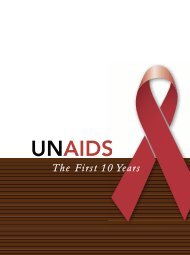Task Shifting - Global Recommendations and Guidelines - unaids
Task Shifting - Global Recommendations and Guidelines - unaids
Task Shifting - Global Recommendations and Guidelines - unaids
Create successful ePaper yourself
Turn your PDF publications into a flip-book with our unique Google optimized e-Paper software.
<strong>Recommendations</strong> on the organization of clinical care services<br />
traditionally the responsibility of medical doctors Annex a . It follows, therefore, that extending the<br />
scope of practice of nurses to allow them to deliver a wider range of HIV services could increase<br />
access to services amid a shortage of more specialist health-care workers.<br />
A number of studies have observed a successful expansion of the role of nurses in a wide range<br />
of health services, including for HIV, in both resource-constrained <strong>and</strong> non-resource-constrained<br />
settings 5-8 216 .<br />
One of the earliest examples is from Botswana, where the quest to increase access to<br />
antiretroviral therapy using the medical doctor-led model of treatment <strong>and</strong> care that has evolved<br />
in industrialized countries was to prove impossible due to a shortage of medical doctors. Two<br />
nurse-centred antiretroviral therapy delivery pilot projects started in 2004 <strong>and</strong> have shown<br />
reduced waiting lists (indicating increased access to treatment), reduced congestion at<br />
centralized antiretroviral therapy centres, reduced unnecessary travel by service users <strong>and</strong> the<br />
localized provision of support for adherence <strong>and</strong> education 217 . In Ug<strong>and</strong>a many health centres<br />
are run by nurses or midwives without either a medical doctor or non-physician clinician on site.<br />
The WHO-Commissioned Study on <strong>Task</strong> <strong>Shifting</strong> observed models of HIV care delivery that used<br />
a nurse-centred approach in combination with a significant community-based component. These<br />
models were achieving rapid scale-up in access to HIV services in, Ethiopia, Haiti, Malawi,<br />
Rw<strong>and</strong>a <strong>and</strong> Ug<strong>and</strong>a.<br />
There are particularly convincing data on the safety <strong>and</strong> quality of outcomes for service users in<br />
both Haiti <strong>and</strong> Rw<strong>and</strong>a Annex a . The HIV treatment programmes that were using a task shifting<br />
approach showed low rates of ab<strong>and</strong>onment; low rates of failure of first-line antiretroviral therapy;<br />
low rates of switch to second-line therapy; <strong>and</strong> rates of mortality at 12 months that were<br />
comparable to published studies from similar settings. Furthermore, people living with HIV<br />
reported high levels of satisfaction with their health care.<br />
Qualitative interviews <strong>and</strong> focus groups with staff members in sites where task shifting was<br />
occurring found that nurses <strong>and</strong> doctors agreed with the usefulness of task shifting <strong>and</strong> reported<br />
that they were willing both to take on more complicated tasks, <strong>and</strong> to shift more tasks to other<br />
cadres in the setting of appropriate training <strong>and</strong> mentorship Annex a .<br />
Advantages:<br />
• Nurses are more numerous than medical doctors <strong>and</strong> non-physician clinicians in many of the<br />
countries that face shortages of human resources for health.<br />
• Extending the scope of practice of nurses <strong>and</strong> midwives can increase access to services in<br />
the absence of medical doctors <strong>and</strong> non-physician clinicians.<br />
• Exp<strong>and</strong>ing the role of nurses <strong>and</strong> midwives can help to ease bottlenecks <strong>and</strong> brings services<br />
closer to service users.<br />
Uncertainties:<br />
• To achieve the best outcomes, a nurse-centred service delivery model requires regular<br />
supportive supervision <strong>and</strong> immediate opportunities for referral to a medical doctor or nonphysician<br />
clinician.<br />
Selected examples of experience/additional resources:<br />
The WHO-Commissioned Study on <strong>Task</strong> <strong>Shifting</strong> documents numerous examples of HIV service<br />
delivery where nurses are undertaking tasks formally considered the responsibility of medical<br />
doctors or non-physician clinicians Annex a .<br />
In Ethiopia <strong>and</strong> Malawi the scope of practice of nurses has been formally extended to include the<br />
prescription of antiretroviral therapy in public sector health services.<br />
44

















